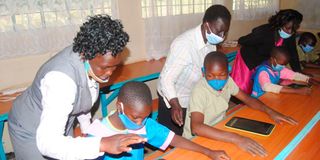All hands must be on deck for CBC to work

Grade Three pupils at Turi Sulgwita Primary School in Nakuru County before a practical lesson of filtration.
Competence based curricula have been in use all over the world since the mid-1970s, with various success rates. If well-implemented, and any underlying problems solved, they have been found to be quite effective methods of transferring and retaining knowledge, in stark contrast to previous educational systems, which were more content-based. These former education systems focused on memorisation rather than understanding.
However, the biggest challenge with the implementation of the competency-based curriculum (CBC) in Kenya has been poor communication and inadequate investment in the infrastructure and time needed to ensure successful outcomes.
For example, many parents found out about the need for their participation when CBC was already being rolled out. Many assumptions were also made about the time and level of ability it would require of parents. Guesses were also made about resources, which not all parents, learners, schools and homes have equal access to. The curriculum also treats all participants and stakeholders as equals, paying no attention to Kenya’s deeply unequal social context.
Another challenge is unsolved underlying issues. There was no way CBC was going to succeed amid the myriad infrastructural problems in Kenya’s learning hardware and software. A new curriculum cannot solve hardware challenges like disintegrating buildings, or schools with no toilets.
However zealous, no curriculum can sidestep software obstacles. These include inadequate pay for overworked teachers. Educational software also includes the children and minors themselves.
Many Kenyan children struggle to reach their schools. Many go hungry. Despite ministerial directives and tax allocations to provide sanitary towels, these have not reached all those they are supposed to. What real possibilities can new learning materials and methods have in the face of such massive systemic dysfunction?
Heavyhanded decisions
Parents should engage in direct discussions with the Education ministry and schools, instead of heavyhanded decisions being made about their involvement.
Teachers had sensitisation workshops and training. A serious error was, however, made in assuming that parents could just be forced to go with the flow. Involving parents (even to solve the matter of why they feel they may not have time or should not be involved) would bring to light new ways of fixing the challenges.
The second solution lies in finding ways to equalise the contexts of our schools, especially public schools, with regard to books, learning technology, amenities and staff. This would then allow for an honest assessment of the performance of the curriculum on its own merit, rather than piling it on top of these valid challenges that have been there for decades.
Moreover, there should be harmonised participation of all – from learners to parents and teachers, as well as the state and other suppliers – for the ambitious implementation of this new curriculum to have a fair chance.
The writer is a policy analyst. [email protected]





